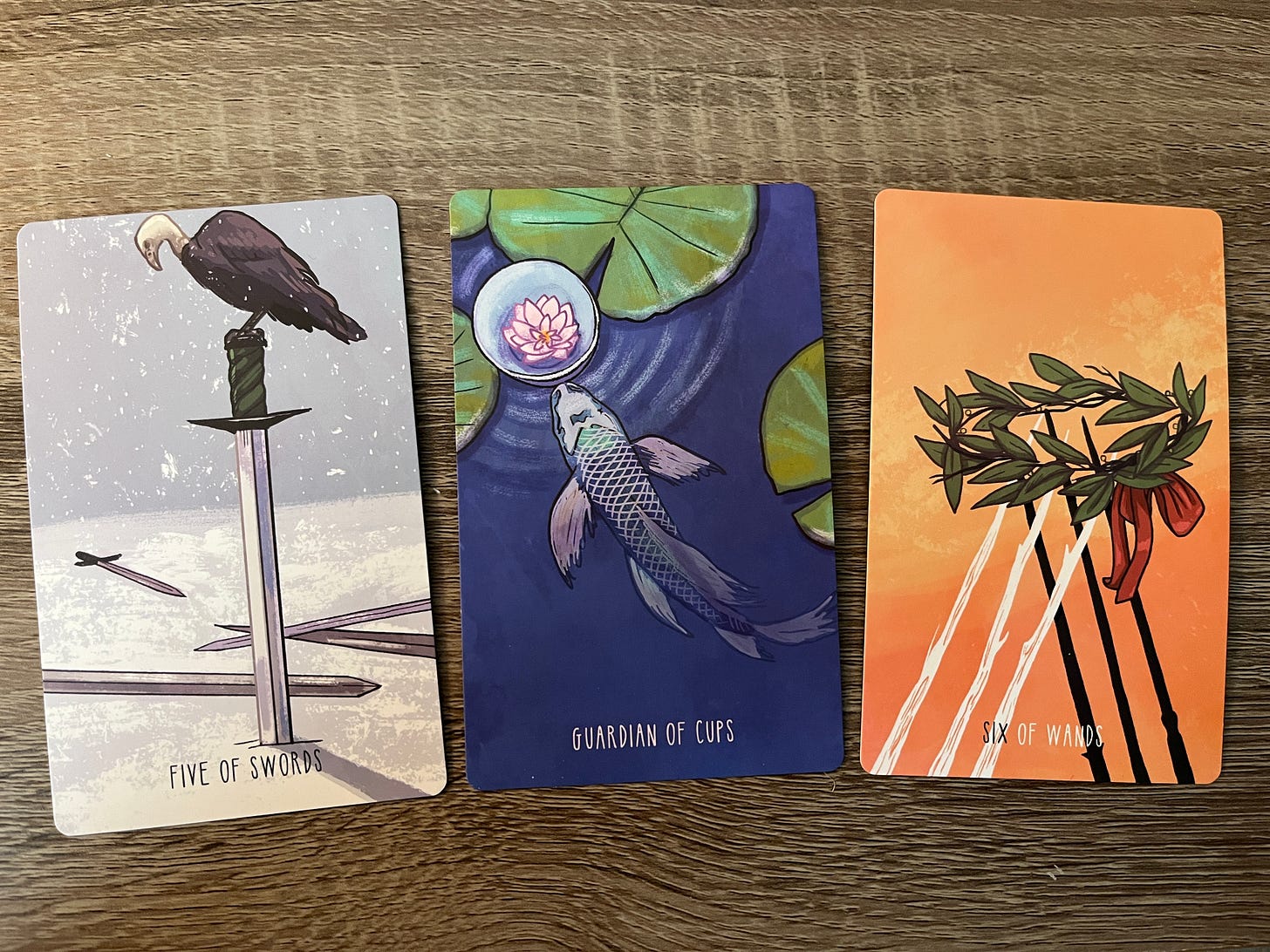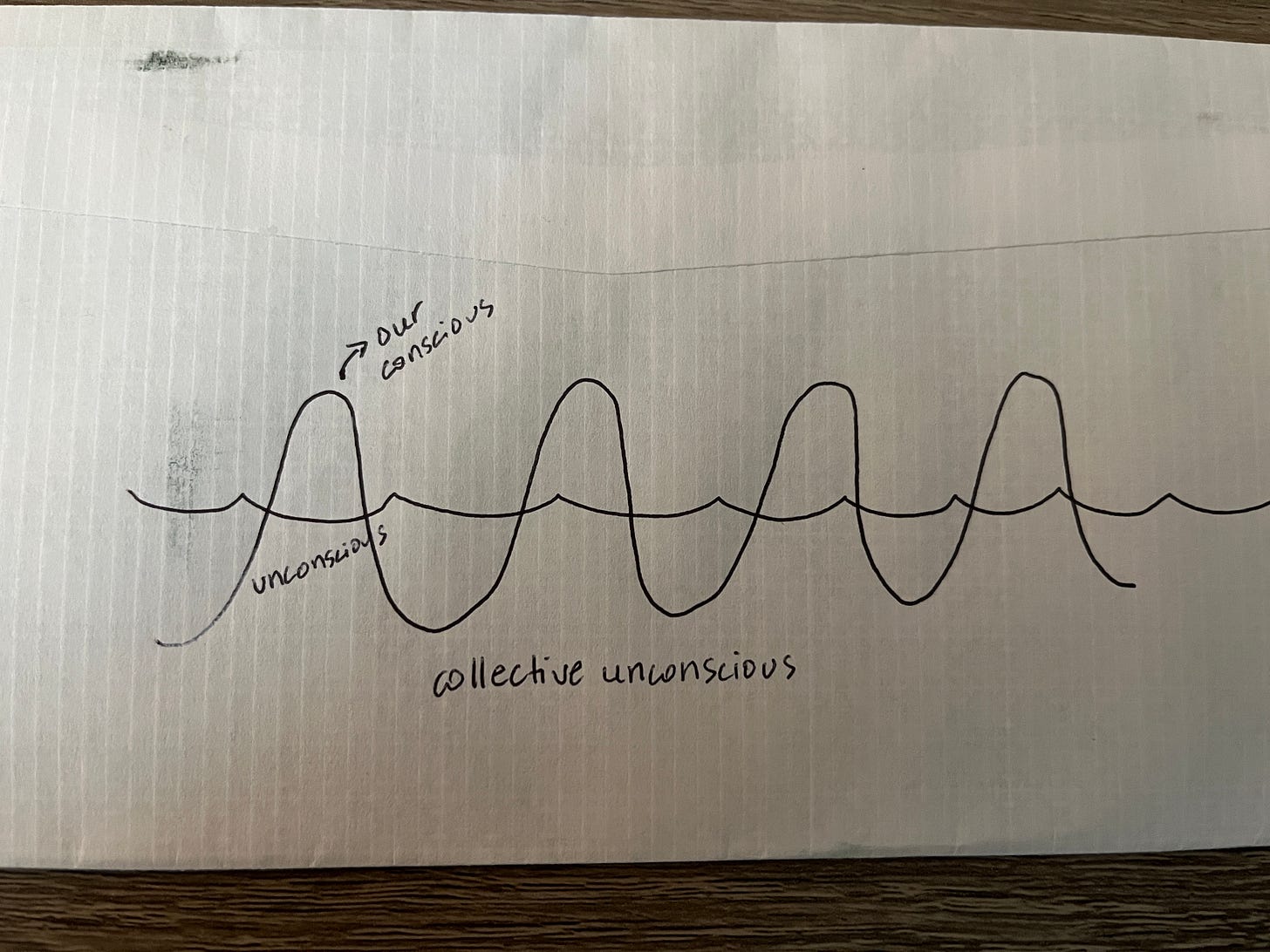Tarot as a Way to Heal From Religious Trauma
It's not about predicting the future; it's about listening to intuition
What a couple of weeks! Politically, we went from a death march towards hell to a surge of enthusiasm and, dare I say, hopefulness all in one 24 hour period. The Olympics are halfway done and I feel like a kid again tuning into primetime television (live on Peacock, not actual TV, lol) to watch the American highlights of the day. My family has had some exciting news on the personal front as well, including a surprise that I’d won a free race entry from Runner’s World for the Boulderthon half marathon! I’ll get to go to my home state and the town I lived in for two years and run 13.1 miles in beautiful mile-high Boulder. LOVE! 😍
If the title of this post didn’t scare you off, I hope today might bring a little further understanding about a topic that was once VERY taboo in our religious spheres. If it’s not for you, feel free to take a pass and we’ll meet up next time. But maybe learning about tarot might not actually be as scary and weird as it seems.
“Trusting my intuition” was something that was seen as Very Bad growing up evangelical. You were there, too: being taught that our desires were somehow innately sinful, that our emotions were not to be trusted, and that every thought, every impulse, had to be taken captive and subsumed into what god wanted.
Ironically, if you really want to touch into what the divine (or whoever) wants for you, it requires a good bit of intuition! This is why church leaders were quick to take the place of authority in our lives, giving us ready-made answers that probably had little to do with our own best good and more to do with what they thought would best serve their idea of god and the church. If we’d been encouraged to come into contact with the quiet voice / sensing inside that can truly provide guidance?? All hell would have broken loose! (For real, right? Hell would be no more!)
I’ve shared that I’ve started to dabble1 with tarot and had bought a pretty deck and a journal specifically for tarot insights. In the last few weeks, I’ve dipped my toe into using the cards and trying out some actual readings, and I’ve been struck by how accessible and not-devil-worshippy it is… and how fun it is, too!
From what I’ve read and the way I’m using it, tarot is a way to tap into your deepest intuition, and for me, it really helps to have a physical way to interact with that (rather than just searching my mind or getting lost in my thoughts). I like how the book I have describes it: even for card pulls about the future, it’s the future based on how you’re currently thinking or believing, not as it has to be. Tarot doesn’t tell you what will be, it tells you how things are. That means that it’s not fortune-telling the future, but rather your deepest sense of knowing is helping you realize what might play out if your current beliefs / attitudes / practices stay in place!
If any readers are into Carl Jung or Jungian theory, this might resonate: tarot is tapping not only into your own deep intuition and hard-to-access subconscious, but the collective unconscious that we all are part of, knowingly or not. I’ll never forget this simple illustration my grad school professor shared with us that might be helpful for you (recreated by me, on the back of an envelope 😂):
So, if you can try and suspend any potential disbelief… how do you do this?
Here is how I’ve been practicing, the few times I’ve deliberately engaged: I wait for a time when I’m feeling mentally present and ready to reflect. Sometimes I avoid tarot if I feel like I specifically don’t want a particular answer to a question I want to pose, because I want to bring an open attitude to the practice. I’ll spend a few minutes centering with some calming breath work, and then I’ll shuffle the cards and do some kind of draw. It’s just simple draws so far: one or three cards, nothing complicated.
When I select the card(s), I spread them out face down and tune in to myself to see which card I feel drawn to, or in other words, which one seems to be emanating a certain kind of energy to me. It’s purely intuitive! I can’t see what’s on the face of the card. I might hover my hand over the cards and see if anything feels like a “hot spot2,” or I might notice where my eyes keep going back to. This part always feel a little nervous, because what if the card I draw feels scary, or wrong? Am I really just supposed to trust this wacky process that somehow I’m going to pick the card that just “feels right”??!
Yes, yes I am.
The wild thing is that each time when I see the cards, it’s felt really meaningful! It turns out, even the cards that aren’t happy cards, or that imply some heartache or pain or struggle, aren’t bad. Maybe I already went through the difficult thing, or it’s describing a way I feel now. I haven’t brought anything bad upon myself by selecting a “hard” card.
I also love the flexibility of tarot. Once I drew a card intending to just do one, but after reading the card (or, reading my guidebook about the card, because I’m a newbie and I don’t know what any of them mean yet on my own 😅), I sensed that I should make it a 3-card draw and do past/present/future. So I did! And it made perfect sense to me. I was asking a question related to running and racing (see? you don’t have to get super deep and spiritual with this!) and the 3-card draw felt like it fit the question perfectly.

I’ve been able to carry the lessons with me, mentally. I’ll typically journal a little bit: write down the cards and the meanings from the guidebook, and a few thoughts about how I think it applies to my current situation. The simplicity and the visual nature of the cards helps it stick with me. I could literally take them out and revisit them if I needed a reminder of it to help keep me focused / determined / compassionate / intuitive.
Has anyone else noticed the parallels between practicing tarot this way, and how an evangelical might engage in Bible study and prayer?
Both require setting aside some “quiet time” (though I don’t think I can ever use that phrase again for myself, blech!!! 🥴). Both draw on an outside “text” (or, illustrated cards!) outside oneself to gain inspiration or wisdom. Both look for ways to apply the “text” to your own personal life.
A major difference, at least with the way I practiced evangelical Christianity, is where the locus of control is. As an evangelical, it was never in myself. Someone else always had the answers, the wisdom: a god separate from myself, mediated through the church and white men’s interpretation of the Bible.
What I love about tarot is how the locus of control is in yourself. You aren’t looking to someone else for the answers: the idea is that some combination of your intuition and the collective unconscious brings you the cards that reflect your deepest knowing. Then, you are free—even encouraged!—to interpret the cards in a way that makes sense to you and your intuition.
It’s not as intimidating or scary as I once thought it would be. There is SO much I have yet to learn, but I realized as I fanned through the deck, looking for the cards for the above picture, that it’s going to be really fun learning more and tapping into a part of myself that has so far laid pretty dormant! I’m excited to keep exploring this spiritual practice.
Have you dabbled in any once-forbidden spiritual practices? What are your thoughts about tarot? I’m a newbie, so I welcome your knowledge and insights about it, too!
By the way, “dabble with tarot” STILL brings up all the associations of getting caught up with the devil and that soon I’m going to go off the deep end 🙄
I did Level One Reiki training years ago and was introduced to the idea of noticing warmth and energy coming from your hands, so I’m applying that same knowledge to this.






Love the depth you bring to this practice, Christine. This says it so well: "...some combination of your intuition and the collective unconscious brings you the cards that reflect your deepest knowing." It is a profound and rich process in which one is interacting with one's own psyche, the collective psyche of the spiritual universe (which dare I say includes "god" and all other intelligences), and the physical universe. What could be more profound or meaningful? The truly amazing thing is it works almost every time, which is against the odds. It almost never seems random.
Personally, I initially felt very uneasy at exploring tarot, contacting spirit guides, and reading channelled books, yet all contain so much spiritual wisdom, I don't look back. Interestingly, when something such as a channelled book does not contain wisdom and feels like a fraud or a mistaken view, my intuition knows that too! What a shame that over-controlling religion kept us for so long from knowing the deeper wisdom of the universe and trusting our own spirit to find it and connect with it.
"From what I’ve read and the way I’m using it, tarot is a way to tap into your deepest intuition" . . .
A few years back, John Sandford has his detective character Lucas Davenport consult a local artist and computer hacker, Kidd (crossover from another Sandford series - IYKYK) about a case. Kidd, the ultimate rationalist, uses the tarot. He explains to Davenport that he doesn't believe in being guided by mystical spirit forces, but that laying and examining the cards forces him out of his comfortable thought patterns and sometimes triggers new and helpful insights. Something very similar, I think, to what you're describing. As I pondered that, it changed my view of the tarot, which to be fair was always more "it's superstition" than "it's Satanic" since I've never been at home in the medieval version of Christianity, in my own church (where it's a minority view) or others.
In a larger sense, it also makes me wonder how many healthy mental awareness practices were squelched as "Satanism" or "witchcraft" over the centuries. "Those people must be getting info from the Evil One or they'd be as blind and stumbling as the rest of us!"
Unfortunately that kind of thinking is on the rise again, predicted 45 years ago by James Michener in his novel "Space." It's no time to relax - it's not in the cards. 😉
Thanks for, as usual, a thoughtful essay. Good luck in the half-marathon!